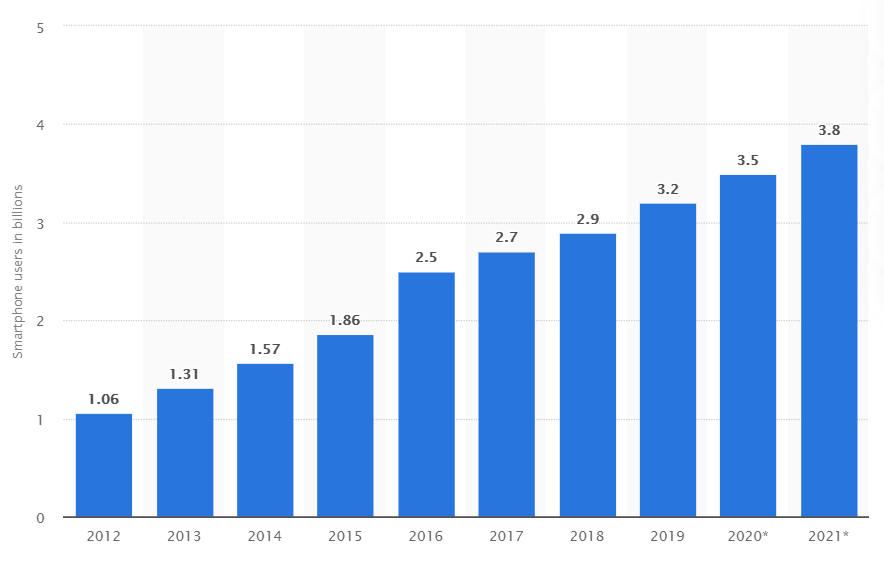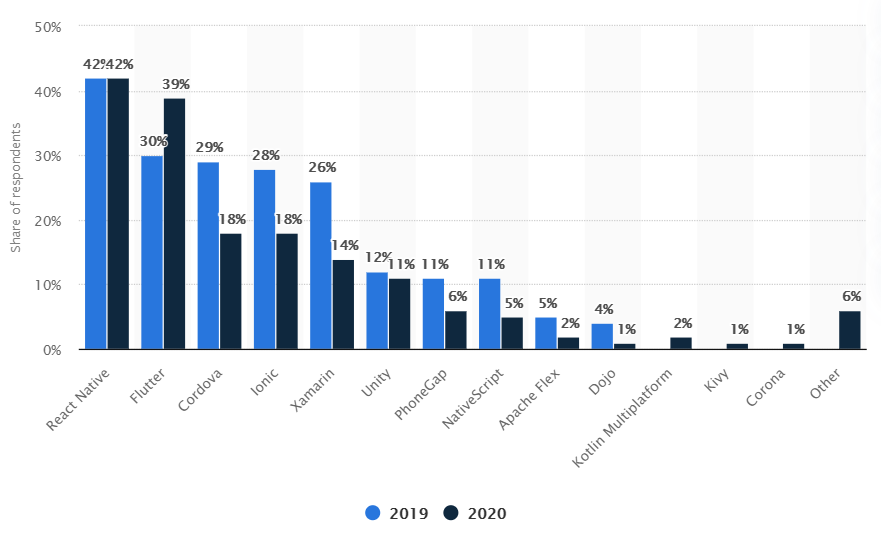The cost of mobile app development is a continuous source of uncertainty and can vary wildly depending on your project’s scale, required features, and also the level of customization. Generally, there is no fixed cost, each application needs a different framework and timeline to develop. However, the mobile development cost varies from $10.000 for a basic app, or an MVP to $100.000 when it comes to a complicated one.
Mobile App Development Background
As shown in the bar chart, worldwide smartphone usage has increased by a staggering 258% in the past decade. This naturally results in increased app usage and has helped the mobile app industry become an exceptionally profitable and high-grossing business sector.
Smartphone Users Worldwide 2012 to 2021

In just 2020 alone, the industry collectively grossed $170.52 billion in revenue (source: Grand View Research) with profits continuing to increase. Experts predict the industry will be worth an astounding $407.31 billion by 2026 (source: Allied Market Research) .
Both iOS and Android are hugely popular and flourishing mobile platforms known the world over. According to a Buildfire Survey, iOS garners larger profits from mobile apps, with 25% of developers earning $5000 monthly. Sixteen percent of Android users reported earning the same, despite making up 78% of the world’s smartphone users.
There are endless business opportunities and countless amounts of money to be made.
Which Mobile App Framework is Suitable for Your Business?
Your project’s size and specific needs will determine the best mobile framework for you. For instance, costly Native apps are not ideal for smaller businesses as some of their larger functions may prove extraneous. Instead, small-scale ventures may opt for React Native apps with more specific functionality and platform capabilities. Still, larger enterprises with plans to grow and expand their business empire, or wish to develop high graphic games, may find Native Apps more advantageous. Either option can be tailored to suit a project’s demands.

Cross-Platform Mobile Frameworks Used by Software Developers Worldwide in 2019 and 2020
Source: Statista 2021
What Are Native Apps?
Native apps are software programs designed for use on specific devices such as laptops, phones, or tablets. Users access them from dedicated app stores such as Google Play or the Apple Store. One main advantage of native apps is that they provide the developer with limitless control of functionality. Designers can integrate elements, such as GPS, accelerometers, or cameras, to perfectly engineer a glitch-free user experience with a consistent and attractive user interface.
Additionally, it requires no middleware to interact with Application Program Interfaces (APIs), making them ideal for RAM-hungry games with large graphics due to their rapid response times and functionality. Native apps can also access the latest software updates from Android and iOS as they have direct access to their APIs. The demand for native apps is still growing
Native App Pros and Cons
What Are Hybrid Apps?
Hybrid apps are software applications that combine functionalities of both Native apps and web-based applications. They are perfect for clients looking for a more cost-effective and quick app development experience. In addition to their low cost, the main advantage of Hybrid apps is they are quick and easy to update, saving the user time. As the process is similar to updating a webpage, hybrid apps do not require store approval from Apple or Android, nor are they installed through online stores. Rather, hybrid apps can be loaded via a simple web link.
Hybrid Apps Pros and Cons
Pros:
- Cost-Effective Development: A single codebase reduces development expenses across multiple platforms.
- Low Maintenance Needed: Easier updates and maintenance compared to native apps.
- Less Time Needed for Development: Faster development due to shared code for iOS and Android.
Cons:
- Flawed Performance: Not as smooth or fast as native apps, especially for complex features.
- Issues with Debugging: Debugging can be challenging due to cross-platform compatibility issues.
- Absence of Independent Performance: Relies on web view, leading to limitations in accessing device features.
- Uninspired User Experience: Often lacks the seamless design and responsiveness of native apps.
Global Costs of Developing a Mobile App
Developing a mobile app also depends on what location you choose for your project. For example, on average, USA/Canada developers charge $100–$250/hour, Western Europe ranges from $80–$200/hour, Eastern Europe offers $30–$100/hour, and South Asia (India, Vietnam, etc.) provides competitive rates at $20–$50/hour, making the location a key factor in budgeting.
There are some important key points that you must keep in mind:
- Cost vs Quality Trade: Do not go too cheap, higher development costs in regions like the USA or Europe will have a robust project management.
- Outsourcing Hotspot: If your budget is limited, you may have an alternative option is the outsourcing companies that lead the Western in Southeast Asia to have a more affordable price, and good quality with huge talent pools, especially Vietnamese developers who have the best rates so far compare to other region.
What to Consider When Optimizing Mobile Development Cost
Before making the difficult decision to have your app developed on or offshore consider:
Budget:
Low-priced rent, wages, and taxes make offshore app development ideal for those on a budget. While offshore agencies often receive a bad reputation for delivering poor quality work, there remain countless numbers of agencies that deal specifically with international clients as their regular customers. There’s a huge amount of motivated and talented developers in the offshore marketplace.
Agency Reputation:
Always request the agency’s portfolio before working with them. The portfolio is a great indicator of the developer’s professionalism and experience. Asking to speak with clients for feedback is encouraged as well, and is offered here at Xenia.
Language and Cultural Barriers:
If you choose to work with an offshore agency, confirm the project manager understands your culture and ideally speaks your language to avoid miscommunication. In our experience, working with agencies that employ a native speaker is the best-case scenario.
Over the past several decades, the offshoring of software development has made headlines in the news and media. The image of Asian workers being exploited by western corporations to develop their products cheaply is the predominant image in the minds of most people when they think of offshoring and out-sourcing.
Fortunately, we are hoping to change this cliché. Xenia only selects the best-in-class developers and graphic designers from the very top international companies and universities. Our designs are cutting-edge, our code is clean and we are the security specialists. We ensure our clients are nothing but delighted with the outcome of their projects. We are proud of our global clients who have come from referrals and who continue to return. Our work ethic is far from what people typically associate with Offshore agencies.
Outsourcing in Vietnam
Vietnam’s economy is flourishing. There are numerous reasons why outsourcing your app in Vietnam is recommended over other countries:
Cost:
Many businesses in the U.S. look at Vietnam for outsourcing due to its cheap labor, making it an inexpensive yet efficient option that works to a company’s advantage. Vietnam was ranked 5th on the “Best countries to outsource to in the World in 2019” list, making it a prime candidate for future business endeavors.
Labor workforce:
Vietnam is a top choice for outsourcing projects due to its strong focus on technology and education. Vietnamese workers make up one of the largest groups of foreign professional contracted workers in Singapore, Taiwan, China, and Canada. The country’s 1.4 million-strong technology labor force has a much lower turnover rate and much higher stability rate than competing countries. Overall, companies in Vietnam have an IT-related turnover rate of less than 5%. In India, this turnover rate can be 10% or higher.
Social-economic stability:
Vietnam is one of the most hospitable countries for foreign businesses and investors. The country has a long history of stability while many Asian outsourcing providers are being plagued by political instability. The stability of Vietnam offers businesses an opportunity to expand internationally without dealing with potential geopolitical risks in the region.
Business environment:
Vietnam has enacted several laws and put in place policies to create a secure and predictable business environment, including intellectual property rights, personal property rights, foreign currency regulations, and best banking/finance practices. Ho Chi Minh City in the south and Hanoi in the north both have a population of more than 9 million and offer modern financial centers with international businesses.
Language barrier: English is used widely in Vietnam. An overwhelming majority of the country’s college graduates have a high command of English. Consequently, many IT workers in Vietnam can accomplish their jobs effectively and easily in English.
Conclusion
As the world moves further towards digitalization, the mobile app industry is becoming increasingly popular. People earn millions by utilizing social media platforms such as Facebook and other leading industry apps. Now is the time for your business to reach a greater audience and increase your organization’s revenue and profits.
Moreover, mobile app costs vary across the globe, and a constant debate continues between native and hybrid apps as both are becoming increasingly versatile and expanding their features each day.
Finally, before beginning a project, knowing and trusting your chosen agency is recommended. Doing so will ensure high-quality professional work, and will avoid losing valuable time and money.
Xenia.tech is a mobile app development agency in Vietnam with prices starting around $35 per hour (this price varies depending on the city). We offer the most affordable app development cost compared to other Asian and European countries. Our passion is creating top-quality and high-functioning mobile applications.
Vietnam is home to a booming economy, hospitable people, low exchange rates, and a welcoming industry for those looking to develop quality apps affordably offshore.




